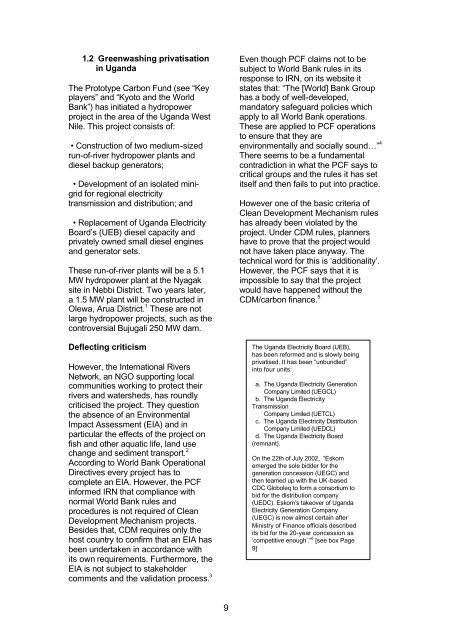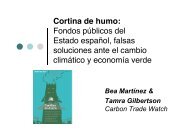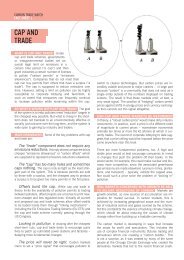The Sky is Not the Limit: - Carbon Trade Watch
The Sky is Not the Limit: - Carbon Trade Watch
The Sky is Not the Limit: - Carbon Trade Watch
- No tags were found...
Create successful ePaper yourself
Turn your PDF publications into a flip-book with our unique Google optimized e-Paper software.
1.2 Greenwashing privat<strong>is</strong>ationin Uganda<strong>The</strong> Prototype <strong>Carbon</strong> Fund (see “Keyplayers” and “Kyoto and <strong>the</strong> WorldBank”) has initiated a hydropowerproject in <strong>the</strong> area of <strong>the</strong> Uganda WestNile. Th<strong>is</strong> project cons<strong>is</strong>ts of:• Construction of two medium-sizedrun-of-river hydropower plants anddiesel backup generators;• Development of an <strong>is</strong>olated minigridfor regional electricitytransm<strong>is</strong>sion and d<strong>is</strong>tribution; and• Replacement of Uganda ElectricityBoard’s (UEB) diesel capacity andprivately owned small diesel enginesand generator sets.<strong>The</strong>se run-of-river plants will be a 5.1MW hydropower plant at <strong>the</strong> Nyagaksite in Nebbi D<strong>is</strong>trict. Two years later,a 1.5 MW plant will be constructed inOlewa, Arua D<strong>is</strong>trict. 1 <strong>The</strong>se are notlarge hydropower projects, such as <strong>the</strong>controversial Bujugali 250 MW dam.Deflecting critic<strong>is</strong>mHowever, <strong>the</strong> International RiversNetwork, an NGO supporting localcommunities working to protect <strong>the</strong>irrivers and watersheds, has roundlycritic<strong>is</strong>ed <strong>the</strong> project. <strong>The</strong>y question<strong>the</strong> absence of an EnvironmentalImpact Assessment (EIA) and inparticular <strong>the</strong> effects of <strong>the</strong> project onf<strong>is</strong>h and o<strong>the</strong>r aquatic life, land usechange and sediment transport. 2According to World Bank OperationalDirectives every project has tocomplete an EIA. However, <strong>the</strong> PCFinformed IRN that compliance withnormal World Bank rules andprocedures <strong>is</strong> not required of CleanDevelopment Mechan<strong>is</strong>m projects.Besides that, CDM requires only <strong>the</strong>host country to confirm that an EIA hasbeen undertaken in accordance withits own requirements. Fur<strong>the</strong>rmore, <strong>the</strong>EIA <strong>is</strong> not subject to stakeholdercomments and <strong>the</strong> validation process. 3Even though PCF claims not to besubject to World Bank rules in itsresponse to IRN, on its website itstates that: “<strong>The</strong> [World] Bank Grouphas a body of well-developed,mandatory safeguard policies whichapply to all World Bank operations.<strong>The</strong>se are applied to PCF operationsto ensure that <strong>the</strong>y areenvironmentally and socially sound…” 4<strong>The</strong>re seems to be a fundamentalcontradiction in what <strong>the</strong> PCF says tocritical groups and <strong>the</strong> rules it has setitself and <strong>the</strong>n fails to put into practice.However one of <strong>the</strong> basic criteria ofClean Development Mechan<strong>is</strong>m ruleshas already been violated by <strong>the</strong>project. Under CDM rules, plannershave to prove that <strong>the</strong> project wouldnot have taken place anyway. <strong>The</strong>technical word for th<strong>is</strong> <strong>is</strong> ‘additionality’.However, <strong>the</strong> PCF says that it <strong>is</strong>impossible to say that <strong>the</strong> projectwould have happened without <strong>the</strong>CDM/carbon finance. 5<strong>The</strong> Uganda Electricity Board (UEB),has been reformed and <strong>is</strong> slowly beingprivat<strong>is</strong>ed. It has been “unbundled”into four units:a. <strong>The</strong> Uganda Electricity GenerationCompany <strong>Limit</strong>ed (UEGCL)b. <strong>The</strong> Uganda ElectricityTransm<strong>is</strong>sionCompany <strong>Limit</strong>ed (UETCL)c. <strong>The</strong> Uganda Electricity D<strong>is</strong>tributionCompany <strong>Limit</strong>ed (UEDCL)d. <strong>The</strong> Uganda Electricity Board(remnant).On <strong>the</strong> 22th of July 2002, “Eskomemerged <strong>the</strong> sole bidder for <strong>the</strong>generation concession (UEGC) and<strong>the</strong>n teamed up with <strong>the</strong> UK-basedCDC Globoleq to form a consortium tobid for <strong>the</strong> d<strong>is</strong>tribution company(UEDC). Eskom’s takeover of UgandaElectricity Generation Company(UEGC) <strong>is</strong> now almost certain afterMin<strong>is</strong>try of Finance officials describedits bid for <strong>the</strong> 20-year concession as‘competitive enough’.” 6 [see box Page9]9











